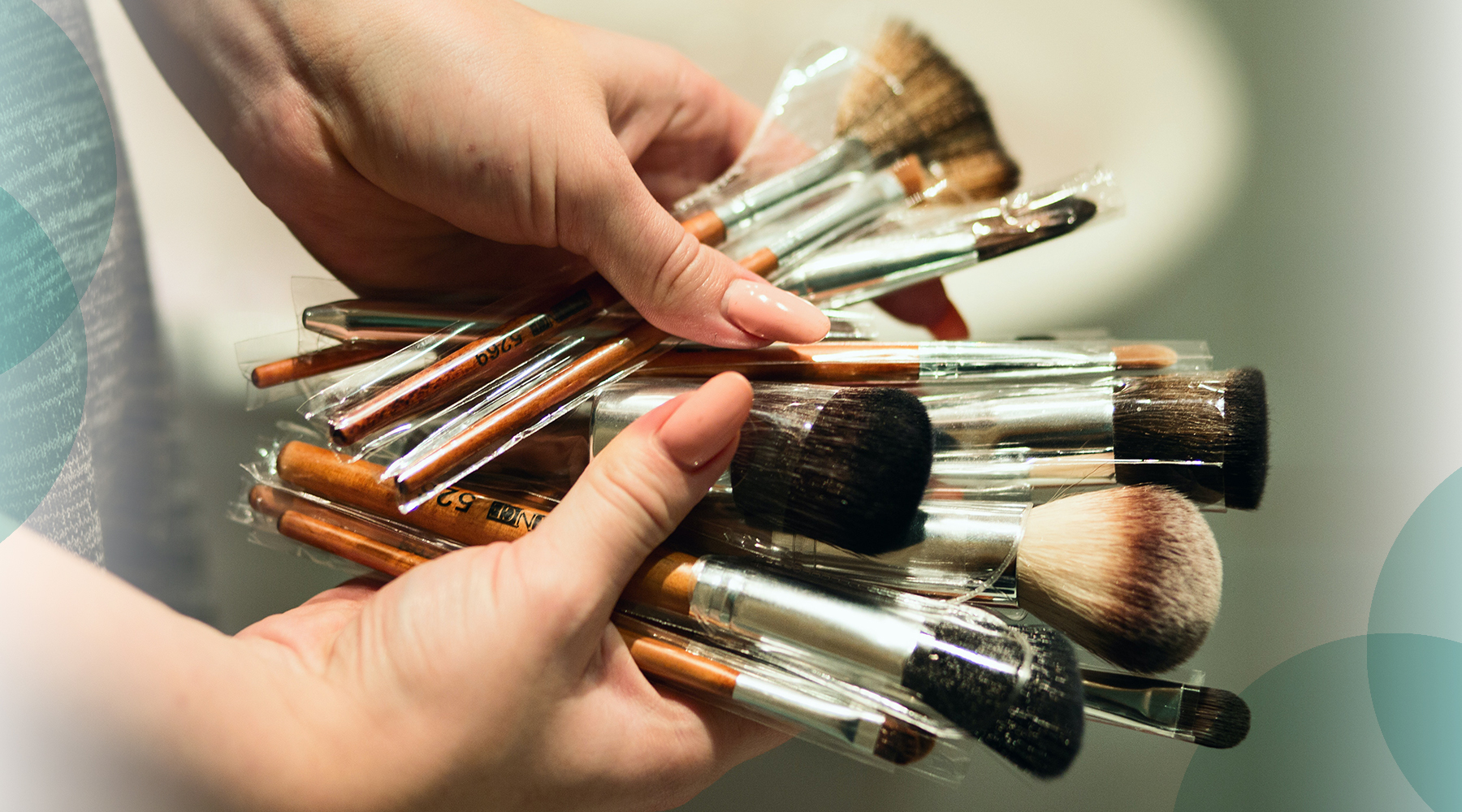I know you’ve already heard it a thousand times before: you should be washing your makeup brushes and sponges pretty often. But, are you really? Like, if you’re really being honest…
I can admit that I am not always the best about washing my makeup brushes and other applicators. At least, not as much as I’m supposed to do it. But admitting you have a problem is the first step, right? From today forward, we’re going to wash our makeup brushes!
Okay, but has anyone told you why you’re supposed to be regularly washing your makeup brushes? Honestly, I was always under the impression that it was just to get rid of any leftover product. All that gunked-up old makeup certainly can’t make for a great application of fresh makeup.
Why You Should Be Washing Makeup Brushes Regularly
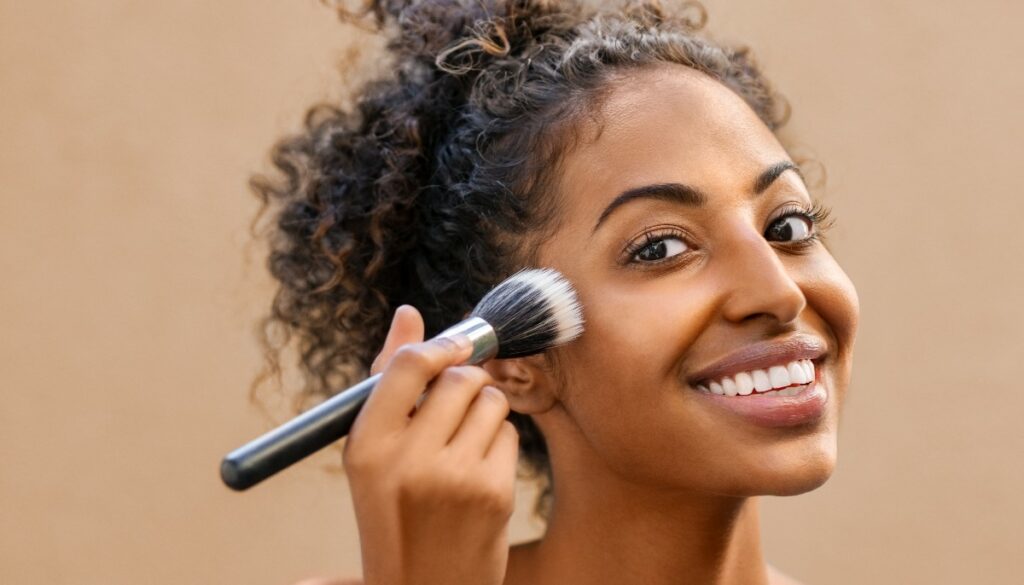
It is true, though. If you want that perfect flawless finish, you have to start with clean brushes. Even if you have the best makeup brushes in the world, they can’t do what they’re meant to if they’re loaded with product buildup. All of that extra buildup will affect the brush’s ability to pick up and lay down pigment, and it won’t be able to blend properly, either. Too much buildup can also affect the actual shape of the brush. You’ll start ending up with spotty application and blending will be difficult.
Related: From Skincare to Makeup — The Best Beauty Products That Cost $5 or Less
Properly cleaning your brushes and sponges isn’t just about makeup application though. Unfortunately, old makeup isn’t the only thing hanging around on your brushes and sponges.
If you’re spending a lot of time, energy, and money on a skincare routine, you could be undoing all of that by not washing your makeup brushes. It’s counterproductive. Dirty makeup brushes and sponges can cause a lot of issues for your skin. We’re talking about skin irritation, rashes, breakouts, and more.
That’s because your brushes are accumulating more than just product buildup. With every swipe, they are also picking up dead skin cells, oil, and more. And while they’re sitting around for the rest of the day, they are likely collecting dust, pet dander, and other impurities from the indoor air.

Yucky bacteria are also lurking around. There might even be fungus or yeast nestled in there. Are those the kinds of things you want to smear all over your face? I think not!
All that aside, there’s one more important reason to give your tools a regular wash. It can help them last longer. Just like with any other tools, taking proper care of your makeup brushes will help extend the life of them.
How Often You Should Be Cleaning Makeup Brushes and Sponges
Now that you know why you should wash your brushes and sponges regularly, let’s talk about how often “regularly” really is. In a perfect world, we would wash our makeup brushes after every use. I know I’m not alone when I say that I absolutely do not have time for that. I wish I did, but I definitely do not.
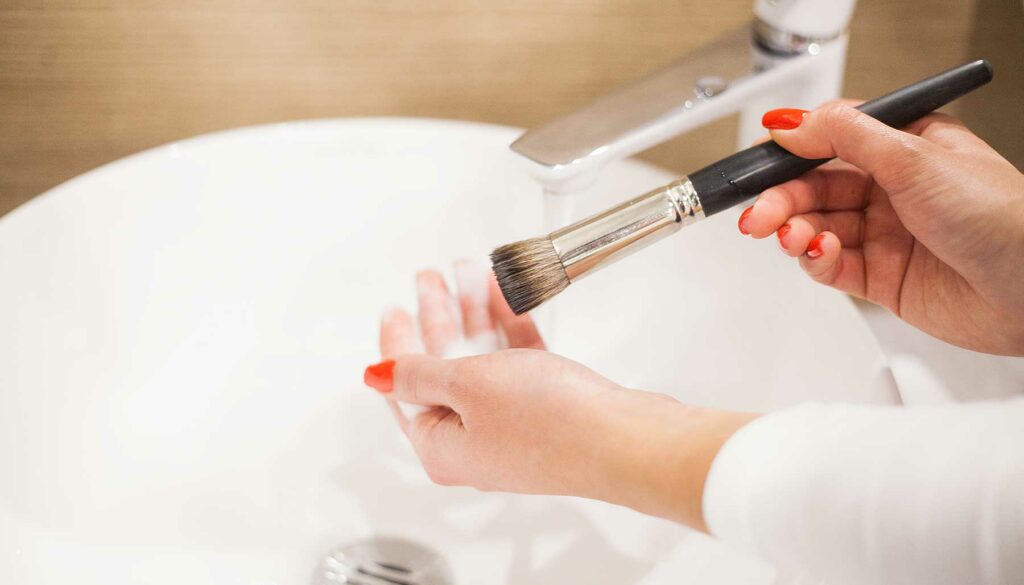
How often you wash your brushes will depend on how much makeup you wear and how often. It also depends on the brushes themselves, and the kind of makeup they are used for. There is no uniform answer across the board. It is reasonable to assume that you can’t be washing them too much, though. In any case, let’s go over a few guidelines that might help you decide how often to wash your makeup brushes.
Brushes used with liquid formulas – like those used for foundation or concealer – should be getting a good wash once each week. Other brushes that are used with powders, such as eye shadow or powder blush, deserve a cleaning once every two weeks.
If you wear a significant amount of makeup pretty regularly, you should bump that up to washing your brushes at least once a week, if not twice a week.
Makeup sponges are obviously pretty porous, sucking up all that oil and dead skin like, well, a sponge. Remember several years ago, when people were cutting open their sponges to find massive amounts of foundation still stuck inside? Hey, they’re literally sponges, okay. It’s best to wash these once a week – if not more. You can also help kill bacteria with the help of a microwave (more on that in just a minute!).
What Kind of Soap to Clean Your Makeup Brushes With
If your brushes are made of synthetic bristles, you can get away with using a wider range of cleaning agents. If your brushes have natural hair bristles, some cleansers may leave them dry or brittle over time. Clearly, if you’re not sure what the bristles are made of, it’s best to play it safe.
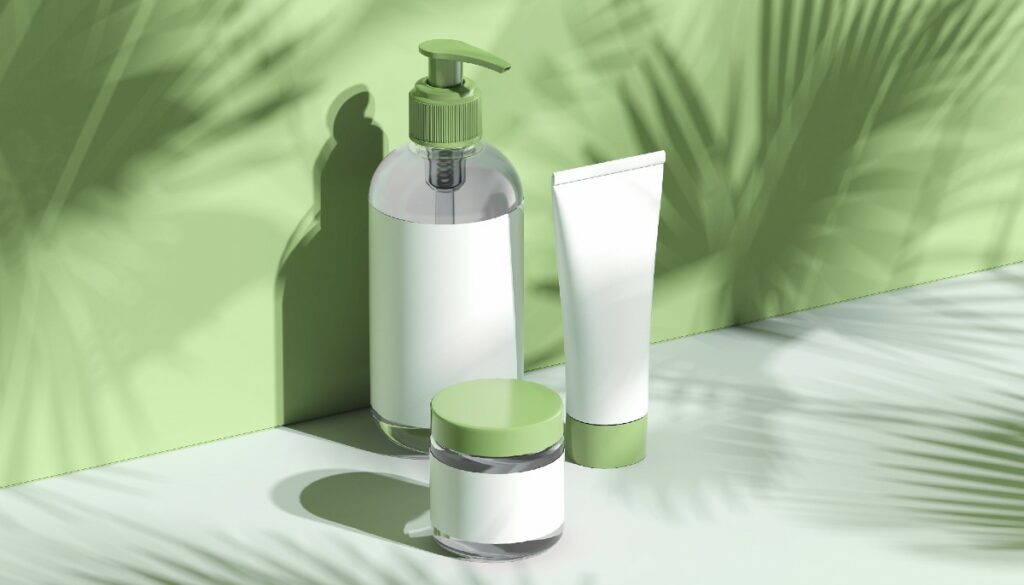
Cleansers made specifically for makeup brushes definitely exist, and are a great option! If you wear makeup a lot, it might be best to go ahead and pick up a cleanser specifically formulated for your brushes. MAC Cosmetics Brush Cleanser is a best-selling classic, while e.l.f. Cosmetics Daily Brush Cleaner is an inexpensive option that comes in a travel-friendly size. Cinema Secrets Makeup Brush Cleaner might be my favorite, though, because it’s antimicrobial.
Shampoos will also get the job done, but it is best to stick with the sulfate-free and paraben-free variety. Sulfates and parabens can strip away too much moisture, leaving the bristles brittle, or could potentially leave a residue behind. Personally, I like to stick to good ol’ Johnson’s Baby Shampoo. It’s inexpensive, gentle, and free of parabens and sulfates.
Similarly, you can use an extra-gentle facial cleanser, provided it does not include moisture-stripping sulfates or parabens. This is an extra way to ensure that the cleanser doesn’t leave behind any residue that might irritate your skin, too – since you are presumably using it on your face already. Check out Philosophy Purity Made Simple One-Step Facial Cleanser.
Even micellar water can do a good job cleaning your makeup brushes. If you’re already using it to gently remove makeup, oil, and dirt from your face, clearly it can do the same for your brushes. I do feel like shampoos and face washes work the best, but micellar water is a great option for regular cleanings, perhaps with a deep wash once a month or so using a brush cleanser or shampoo. Garnier SkinActive Micellar Cleansing Water is an effective and inexpensive option that I keep in my arsenal.
Washing Your Brushes Like a Pro
Now that you are thoroughly convinced to wash your makeup brushes and sponges (you, are convinced, right?), let’s talk about cleansing those brushes like a pro. During this process, keep the base of the brush head, where the metal piece connects the bristles to the handle, away from the soap and water. This is where the bristles are glued to the base, and the cleanser can eventually cause the glue to disintegrate. This will lead to bristles falling out, and no one wants that!
Start by wetting the bristles of the brush with warm water. Add a few drops of soap to the palm of your hand. Gently massage the bristles of your makeup brush in your palm, and then gently massage the bristles with your fingers to further remove the gunk.
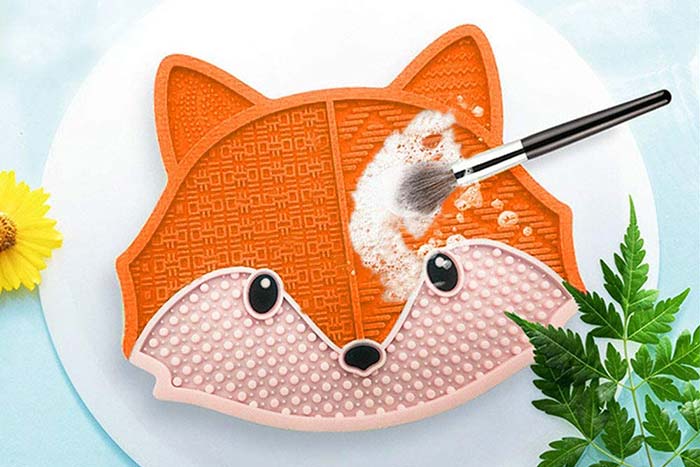
If your brushes are extra yucky, or you wear a lot of makeup, a silicone makeup brush cleaner will do wonders! These have a lot of scrubby surfaces to help clean the bristles even more.
After rinsing the bristles thoroughly, squeeze out any excess moisture with a clean towel.
Re-form the brush back to its original shape, and then let the brush dry with the bristles hanging off the edge of a counter. This way, it will dry in the correct shape.
Washing Your Makeup Sponges Like a Pro
If you’re cleaning makeup sponges, it mostly goes the same way as brushes – but there are a couple of small differences.
Start by holding the sponge under running water to make sure it’s wet all the way through. You want it to really soak up all that water.
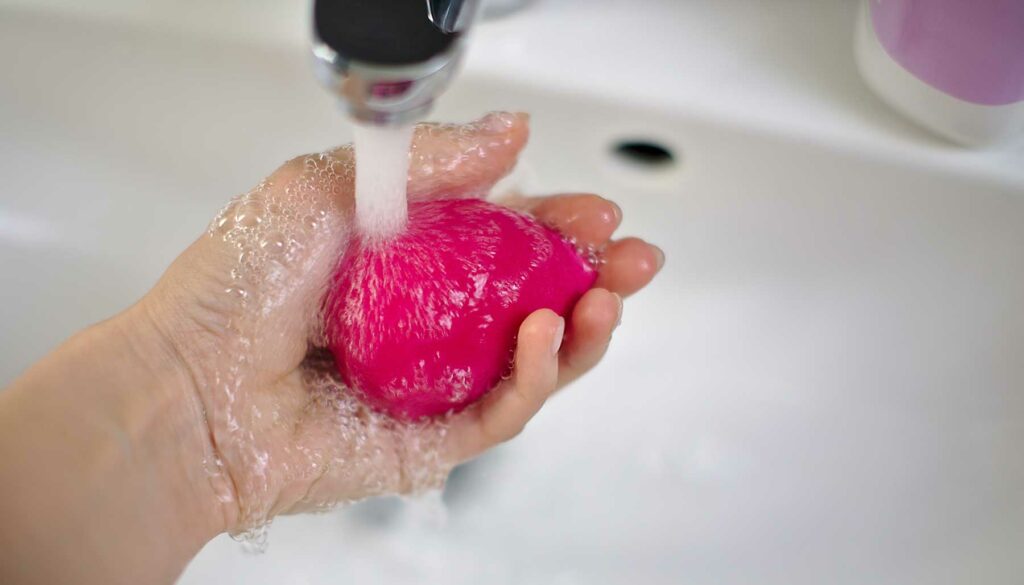
Squeeze the cleanser directly on the sponge, and work it in with your fingers. Massage the sponge for a while to really get all that soap down in there.
After your sponge is nice and soapy, it is time to rinse it thoroughly under running water. Squeeze it a few times, too, to make sure no soap gets left inside.
When you’re done rinsing out the cleanser, there’s an extra step you can take to ensure they’re extra clean. While the sponge is damp, let it go for a spin in the microwave for a few seconds. It’ll zap any leftover bacteria in a flash.
Always let your sponge dry on a hard surface, and not on a towel or other soft surface, where it could stay damp. Good air circulation will help prevent mold from accumulating. And never stick a damp makeup sponge inside of a closed plastic bag. It’s a breeding ground for bacteria!


